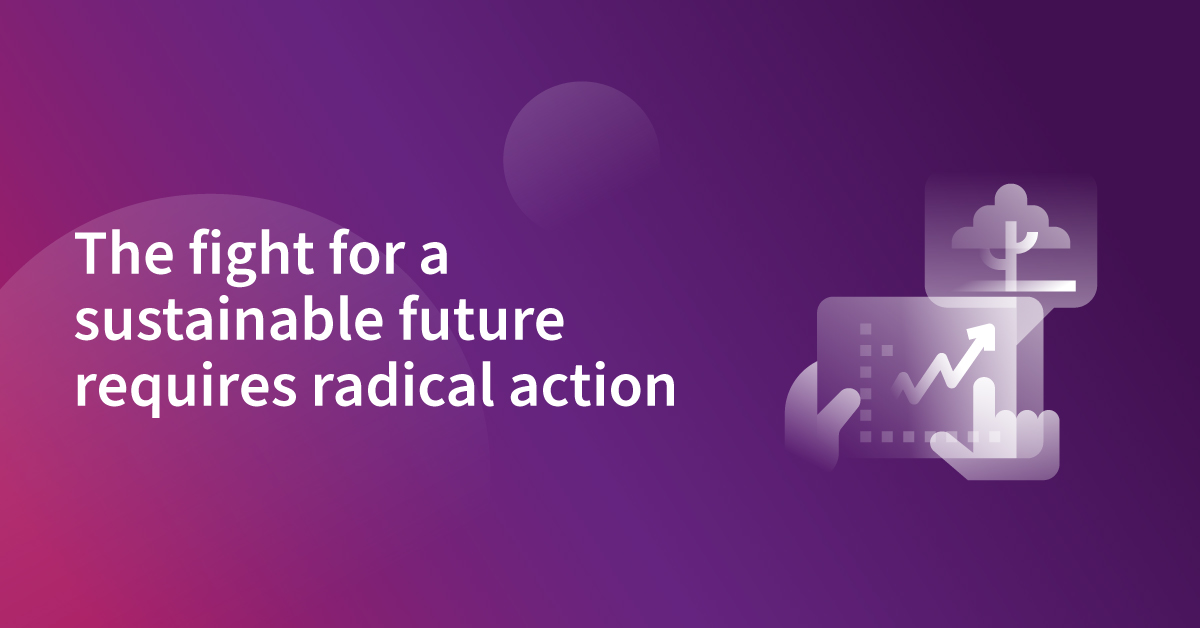The fight for a sustainable future requires radical action

COP26 will take place in Glasgow in November and its aim is to accelerate the momentum behind clean energy and discuss how countries can work towards their net-zero ambitions.
COP26 will have a significant impact on financial services. The world is changing and the industry has a big part to play in this change as we work towards meeting the UN’s sustainable development goals by 2030.
Truly sustainable
Forward-thinking financial services organisations are already pushing for a greener future. There are near-term gains that can be achieved by incorporating sustainable practices but the right sort of action must be taken. Token, short-term changes won’t make the required impact.
Most organisations have moved towards being a little more sustainable, such as introducing recycling programmes or offsetting the carbon footprints of individuals working at home. But goal adjustments or incremental changes won’t hit the targets set out by the UN. Radical, industry-wide change is required.
Further, industry benchmarks in financial services are relatively low. Aiming to be the most sustainable in an industry isn’t saying much. Organisations must be bolder in their thinking and in their actions to drive a change agenda that is steeped in authenticity but also has tangible outcomes.
The sustainability of data
One way financial services organisations can move towards their sustainable goals is by looking at data-driven sustainability. With more organisations waking up and committing to the UN’s net-zero ambitions, financial services firms can lead by developing data standards that drive sustainability over the long term.
Crucially, data can drive sustainability. Whilst this may sound like a daunting proposition, it can be empowering if we reframe the question. One could ask, “How can I make the way we use data more sustainable?” But if you flip the question, ask, “How can I use data to drive sustainability?”
By using data to drive change, organisations can make radical adjustments to organisational structures in a number of ways that can drive huge efficiencies across their green footprint. Radical change can be realised.
Some ideas for the future
A key driver that can instil an ethos of sustainability in an organisation can be to reassess how data is stored. According to a report by Accenture, moving data to the cloud can drive 65% energy reduction and emission reduction of 84%. Changing how data is handled can lead to significant, measurable changes in how a company approaches sustainability.
And making radical changes doesn’t have to stop at data storage. Organisations are changing the way they approach sustainability by creating new products. Green credit cards (which encourage environmentally-friendly purchases) and energy-efficient mortgages are growing in popularity. Product development is driving change and consumers are responding.
According to the 2019 UN CEO Study, 99% of CEOs across various industries recognise the importance of responsible business practices. That’s great to hear, but these leaders must start putting those words into action, delivering change. By making decisions that are based on data-led strategies they can create a more sustainable future.
ESG is a data problem
This is the tip of the proverbial (and rapidly melting) iceberg. There is a lot that needs to be done and fast in order to make a change. This is not your average transformation change and one which will have repercussions for the world at large.
ESG, and the data transformation required to facilitate an ESG-driven agenda will require strategy, operational model redesign, data transformation and a rethink of current processes. How can organisations work to transform their businesses, by offering differentiated ESG propositions to end-users and customers but with one eye on profitability? Solutions will need to scale and change with the times when needed.
And there are, of course, human and environmental factors to consider with every practitioner from branch to boardroom required to know the particular needs of all relevant stakeholders in order to deliver the sustainable financial services that they need.
Data will undoubtedly be a vital cog within this change, acting as a flywheel to sustainability at scale, with the insight required at every level of the organisation to make decisions through a responsible lens.
Act now. Be bold.
The bottom line is that all organisations must think about how they can be more sustainable. But not all organisations will make changes that are bold enough to drive significant global change. That’s why all organisations and their leaders must look beyond near-term efficiencies and think about how they can drive a sustainable long-term future.
We’ve talked on the blog about how bold action on ESG investing will have the most sustainable benefit in the future. There’s also a movement towards embracing sustainable risk where issuing companies are held to higher sustainable levels or give better interest rates if they focus on sustainability. These are radical ideas, the type that won’t come into effect easily.
But with no risk, there is no reward. The fight against climate change and the shifts required to build a more sustainable future will only be won if participants are willing to bet on being a part of a more sustainable world for the good of their businesses and everyone else around them.
Financial services organisations have a great chance to set the agenda for a sustainable future. The time for action is now. And radical action is required.